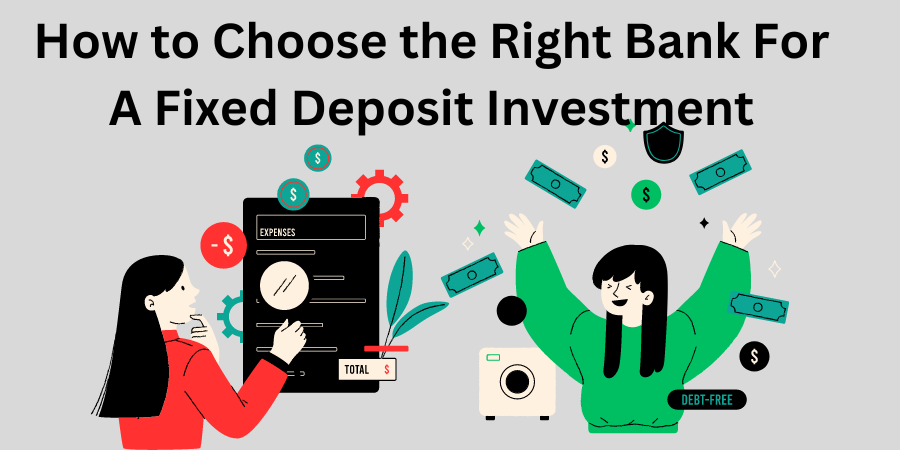Choosing the right bank for a fixed deposit investment is a crucial decision that can significantly impact your financial future. Fixed deposits offer a secure way to grow your savings, but the choice of the bank is equally important to ensure the safety of your investment and maximize returns. In this guide, we will walk you through the essential steps to select the right bank for your fixed deposit investment.
- Reputation and Trustworthiness
Begin your search by considering the reputation and trustworthiness of the banks you are interested in. Look for banks with a strong track record of financial stability and customer satisfaction. You can check online reviews and ratings to gauge the experiences of other investors. A bank with a solid reputation is more likely to provide a safe and reliable environment for your investment.
- Interest Rates
Interest rates are a crucial factor when choosing a bank for your fixed deposit. Different banks offer varying interest rates, and even a small difference can significantly affect your returns over time. Compare the interest rates offered by different banks, and opt for one that offers competitive rates while maintaining financial stability.
- Tenure Options
Consider your investment timeline and financial goals. Some banks offer flexible tenure options for fixed deposits, while others have stricter terms. Ensure that the bank you choose provides tenure choices that align with your objectives. Having flexibility in selecting the tenure can be beneficial for your financial planning.
- Minimum Deposit Requirements
Each bank sets its minimum deposit requirements for fixed deposits. Ensure that the bank’s minimum deposit amount matches your financial capacity. Avoid banks with excessively high minimum requirements that could strain your finances. Choosing a bank with a reasonable minimum deposit makes it more accessible to a broader range of investors.
- Penalty for Premature Withdrawal
Life can be unpredictable, and there may be instances when you need to withdraw your fixed deposit prematurely. Be aware of the penalty charges imposed by the bank in such cases. Opt for a bank with reasonable penalty terms to avoid substantial financial losses if you need to access your funds before the maturity date.
- Customer Service
Good customer service is essential when dealing with financial matters. Evaluate the quality of customer service offered by the bank. Prompt and helpful assistance can make your investment experience smoother and more comfortable, especially when you have inquiries or need assistance with your fixed deposit.
- Online Banking Facilities
In the digital age, convenience is a significant factor. Check if the bank offers online banking facilities for fixed deposit management. This allows you to monitor your investment, receive statements, and make transactions from the comfort of your home. Online accessibility can save you time and effort.
- Insurance Coverage
Investors often overlook this crucial factor. Ensure that the bank provides deposit insurance coverage. This coverage safeguards your investment in case of unforeseen events or, in rare cases, bank failures. Knowing your investment is protected can provide peace of mind.
- Accessibility
Consider the bank’s accessibility and branch network. Opt for a bank with a broad branch network or ATMs near your location. This makes it easier to manage your investment and access funds when needed, especially if you prefer in-person banking services.
- Additional Services
Some banks offer additional benefits, such as loyalty programs or special privileges for fixed deposit customers. Explore these perks, as they can enhance the overall value of your investment. These extras can include preferential interest rates, waived fees, or access to exclusive banking products.
- Tax Implications
Fixed deposit investments are subject to taxation. Familiarize yourself with the tax implications associated with your investment. Some banks may offer tax-saving fixed deposit schemes that provide certain tax benefits. Understanding the tax implications ensures you can plan your finances effectively.
- Flexibility for Renewal
After your fixed deposit matures, you may want to renew it. Check if the bank provides flexible renewal options and whether the interest rates for renewals are competitive. Renewing your fixed deposit with the same bank can be a convenient option if they offer favorable terms.
- Transparency
Transparency is vital in any financial transaction. Ensure that the bank provides clear and concise terms and conditions for fixed deposit investments. Read the fine print to avoid any surprises later on. A transparent bank will have no hidden fees or clauses that could affect your investment negatively.
- Interest Payment Frequency
Different banks offer various options for interest payment frequencies, such as monthly, quarterly, or annually. Choose the one that aligns with your financial goals and needs. Consider whether you need a regular income stream from your fixed deposit or prefer to reinvest the interest.
- Joint Account Facility
If you want to open a fixed deposit jointly with another person, check if the bank offers this facility. Joint accounts can be useful for shared financial goals, such as saving for a family vacation or a down payment on a home.
- Nomination Facility
In the unfortunate event of your demise, a nomination facility ensures that your investment is transferred to the nominee without complications. Verify if the bank provides this option and ensure your nominee’s details are accurately registered.
- Accessibility for Senior Citizens
Senior citizens often receive preferential treatment from banks. If you or a family member is a senior citizen, inquire about special fixed deposit schemes designed for them. These schemes may offer higher interest rates or additional benefits tailored to seniors’ needs.
- Credit Rating
Evaluate the bank’s credit rating from reputable credit rating agencies. A higher credit rating indicates the bank’s financial strength and stability. A bank with a strong credit rating is less likely to face financial difficulties that could jeopardize your investment.
- Mobile App
Having a user-friendly mobile app can simplify your banking experience. Check if the bank offers a mobile app for convenient account management. A well-designed app can provide easy access to your fixed deposit details, statements, and transaction history.
- Sustainability Initiatives
Some investors prioritize banks that engage in environmentally responsible and sustainable practices. Research if the bank aligns with your values in this regard. Some banks have initiatives related to environmental conservation, social responsibility, or ethical banking practices.
- Investment Goals
Consider your investment goals and risk tolerance. Different banks may cater to varying investor profiles. Ensure your chosen bank aligns with your objectives, whether you are seeking stable returns, capital preservation, or higher growth potential.
- Referral Programs
Some banks offer referral programs that provide incentives for referring new customers. Explore such programs to potentially earn additional rewards. Referring friends and family can benefit both you and the people you refer.
- Regular Updates
Select a bank that provides regular updates on your fixed deposit’s performance and maturity date. Timely updates allow you to track the progress of your investment and plan accordingly.
By carefully considering these factors and conducting thorough research, you can make an informed decision when choosing the right bank for your fixed deposit investment. Your choice will not only ensure the safety of your funds but also contribute to your financial well-being and future goals.
Frequently Asked Questions (FAQs)
What is a fixed deposit investment?
A fixed deposit investment is a financial arrangement where an individual deposits a lump sum amount with a bank for a specified period, known as the tenure. In return, the bank pays the depositor a fixed interest rate on the deposit, which is typically higher than that of a regular savings account.
How do I choose the right bank for a fixed deposit investment?
To choose the right bank for a fixed deposit investment, consider factors such as the bank’s reputation, interest rates, tenure options, minimum deposit requirements, and penalties for premature withdrawal. Additionally, assess customer service quality, online banking facilities, insurance coverage, and accessibility.
Can I withdraw my fixed deposit before the maturity date?
Yes, you can withdraw your fixed deposit before the maturity date, but this may incur a penalty. The penalty amount varies from bank to bank, so it’s essential to be aware of the terms and conditions associated with early withdrawals.
Are fixed deposit investments taxable?
Yes, fixed deposit investments are subject to taxation. The interest earned on fixed deposits is typically taxable, and you must declare it in your income tax returns. The tax rate may vary depending on your country’s tax laws and regulations.
What is the benefit of opening a joint fixed deposit account?
Opening a joint fixed deposit account allows two or more individuals to invest together. It’s beneficial for shared financial goals and provides easy access to the funds for all account holders. Joint accounts can be used for various purposes, including saving for a family vacation or building an emergency fund.
How can I check the credit rating of a bank?
You can check the credit rating of a bank by referring to credit rating agencies such as Moody’s, Standard & Poor’s, or Fitch Ratings. These agencies assess and provide credit ratings for banks based on their financial stability and creditworthiness.
In conclusion, selecting the right bank for your fixed deposit investment requires careful consideration of various factors, from reputation and interest rates to customer service and tax implications. By conducting thorough research and assessing your individual financial goals, you can make an informed decision that will help you secure your financial future.




